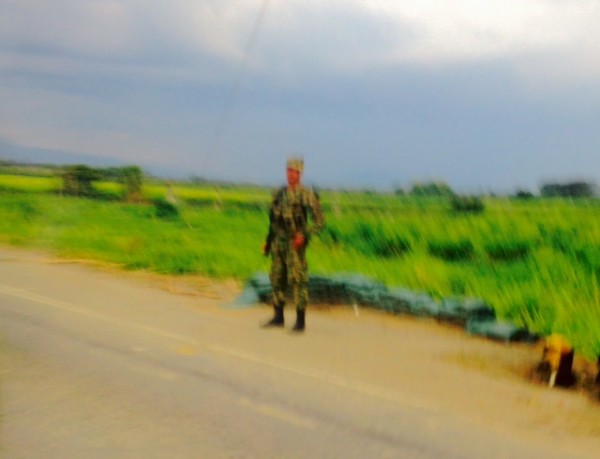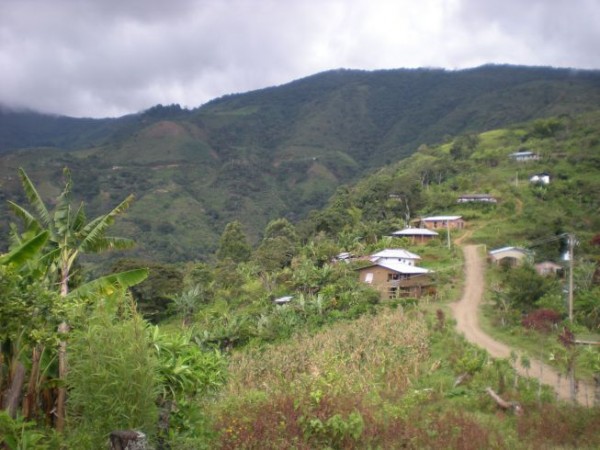The department (state) of Cauca, Colombia, is home to one of Colombia’s largest native American populations, the Paez people, and it also happens to be one of the country’s most renowned growing regions.
Matt Earley of Just Coffee Cooperative, a roastery in Madison, Wis., recently returned from a three-day visit to Fondo Paez, one of Just Coffee’s producer partners through the Cooperative Coffees network. Here Earley shares with Daily Coffee News some reflections on his visit, particularly how people at Fondo Paez and throughout Cauca are dealing with daily life under the dark cloud of civil war and political instability, three years after the cooperative’s own president was assassinated for cash outside a bank.
by Matt Earley of Just Coffee Cooperative
The armed conflict that has raged in Colombia has had a profound affect on the Paez and on the people of Cauca in general. The war against insurgent groups FARC and the ELN has lasted for over 60 years, making it the longest running civil war in the world. The government is now in peace talks with FARC and is negotiating a start to talks with the smaller ELN in hopes of bringing to a close this seemingly never-ending conflict.
That said, many Colombians are skeptical that agreements made can be kept and all are aware that peace talks in the past have ended with little or nothing to show. Add to that the growing number of paramilitary groups and narco-trafficking groups, and the ever-shifting alliances between the guerrillas, the paras, and the narcos, and a lasting peace brought by civil discourse seems remote to many here.
The war has touched everyone in Colombia in some form or another, and in the South the FARC has been especially active in Huila, Narino, and Cauca in the recent years. New paramilitary groups have appeared in the Southern region, as well, causing further instability. In 2011, Fondo Paez president Luis Carlos Mestizo was assassinated leaving the bank by unknown assailants who took all of the cooperative’s cash from coffee sales as they fled. Although this was the most blatant example of the armed conflict’s effects on the Paez farmers, it is only one of many.
(related: Understanding the Restrictive Concept of ‘Women’s Work’ In Coffee Production)
Throughout the years, the Paez have had armed groups moving through their lands, disrupting their lives, and have had to negotiate a fragile peace. Because they are neutral in the conflict and because they have a high degree of legal autonomy in Colombia, they have often been isolated and at risk in the conflict. Some armed groups have been more respectful than others over the years, but in the end they are often looked at with suspicion because they do not take sides.
That uneasy peace was expressed by one farmer during a meeting at the offices of Fondo Paez’s partner and exporter Cosurca (Cooperatives of Southern Cauca). He explained that through different stages the conflict, the tense reality has not changed for them at all. It remains a constant. Despite this, he told us that their job is “to work and to produce,” keeping their lives moving forward as normally as possible. He said that they produce and live their lives “in harmony with and within” nature and that they hope that the earth will protect them because they honor it in what they do. He also felt that because they generally do not have much money they are spared the worst of the extortion, kidnapping, and robbery that many other individuals and groups have suffered through.
Another person explained that everyone in the mountainous Southern region is affected by the conflict on a daily basis. They feel it directly when the groups encroach on their territory and harass them and indirectly by the daily stress of living with war. He said that at any given time there can be 20 roadblocks by the military, the paramilitaries, or the guerrillas between Cosurca’s office just north of Popayan and the Fondo Paez headquarters in Santander de Quilichao. He said that because the conflict is so complicated with struggles to control land, minerals, oil, wood, and drugs, he fears that there is a general lack of will among the armed actors and society to actually end the conflict. And again, he stressed, neither Cosurca nor Fondo Paez participate in the war in any way, and that they are eager to bring peace to all sides and to Colombia.
(related: Colombia’s FNC Launches Innovative Climate-Monitoring Platform for Growers)
Turning all of this over while riding on a bus out of the South, I struck up a conversation with a man who put it in a very hard nutshell:
“I want peace and we pray for peace every day, but it will not be easy. Why would these armed groups who know nothing but war and the profits of their illegal activities be willing to walk away now?The war was once ideological on all sides, but now it is simply business. All of the groups have developed into very well-armed drug trafficking organizations and they know nothing else. How would a guerrilla or paramilitary fighter who has no education, training, or education re-insert themselves as productive members of society? Look at countries like Guatemala and you can see how difficult this it to achieve. I want peace, but most of us have always lived with war. We cannot imagine what peace would look like in our own country.”
So while groups expand and contract, and peace talks endure, the members of Fondo Paez continue on with their work trying to create their own prosperity. In the end it is all they can do, and they are moving forward with remarkable courage, clarity, and conviction.
Nick Brown
Nick Brown is the editor of Daily Coffee News by Roast Magazine.








Comment